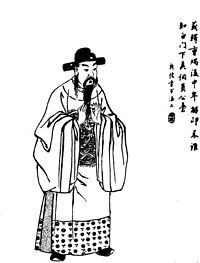Chen Gong
| Chen Gong | |
|---|---|

A Qing dynasty portrait of Chen Gong
|
|
| Advisor of Lü Bu | |
| Born | (Unknown) |
| Died | 198 |
| Names | |
| Traditional Chinese | 陳宮 |
| Simplified Chinese | 陈宫 |
| Pinyin | Chen Gong |
| Wade–Giles | Ch'en Kung |
| Courtesy name | Gongtai (公臺) |
Chen Gong (died 198),courtesy name Gongtai, was an advisor to the warlord Lü Bu in the late Eastern Han dynasty. However, he had started his career under another warlord, Cao Cao, before defecting to Lü Bu. He was executed along with Lü Bu after Cao Cao defeated Lü Bu at the Battle of Xiapi.
Chen Gong was given a positive makeover in the 14th-century historical novel Romance of the Three Kingdoms, which romanticises the events before and during the Three Kingdoms period. In the novel, Chen Gong initially held office as a minor magistrate under the Han government, but he gave up his job after deciding to follow Cao Cao, who was then on the run after attempting to assassinate Dong Zhuo, a tyrannical warlord who was holding the Emperor hostage. However, after witnessing Cao Cao killing Lü Boshe, he secretly left Cao Cao and ultimately joined Lü Bu. His eventual fate in the novel is similar to that in history.
Chen Gong's year of birth is not recorded in history. It is known, however, that he was from Dong Commandery (東郡; south of present-day Shen County, Shandong). He joined Cao Cao around 190, at the time when regional warlords around China formed a coalition against Dong Zhuo, a powerful warlord who held Emperor Xian hostage in the imperial capital, Luoyang. Chen Gong's most significant contribution while serving Cao Cao was the taking over of Yan Province (兖州; covering present-day western Shandong) in 193 through diplomatic efforts, a strategic move which laid down the foundation for Cao Cao's subsequent rise in power.
In 194, however, while Cao Cao was away on a campaign against Tao Qian in Xu Province (徐州; covering present-day northern Jiangsu), Chen Gong defected to a rival warlord, Lü Bu, along with his colleague, Zhang Miao. With the assistance of the two defectors, Lü Bu quickly took over most of Yan Province. Cao Cao hastily returned and laid siege on Lü Bu in Puyang (濮陽). After more than hundred days of stalemate, a famine forced Lü Bu to give up his position and seek refuge under Liu Bei in Xiapi (下邳; present-day Pizhou, Jiangsu), capital of Xu Province.
...
Wikipedia
